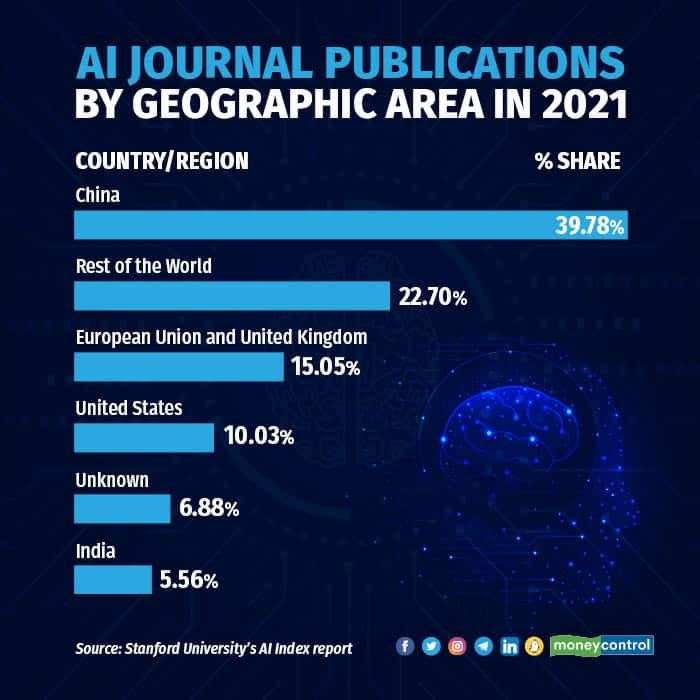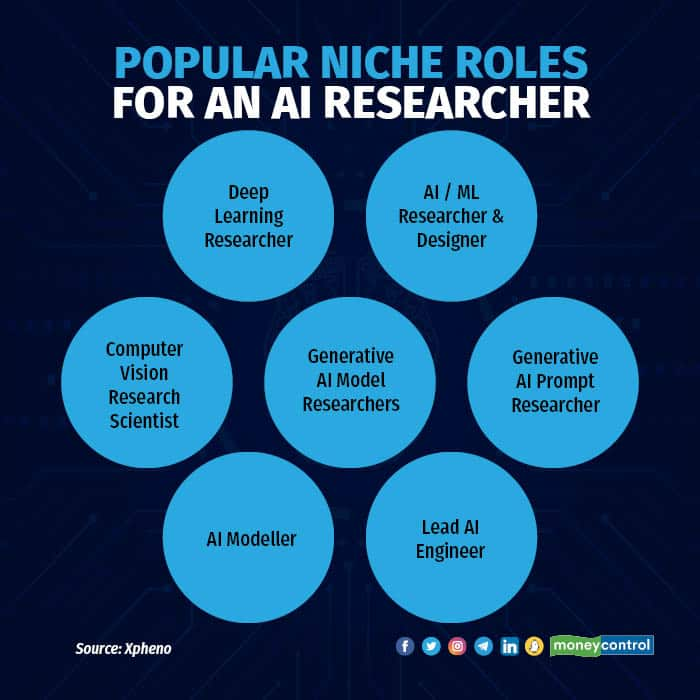



There are currently only a little under 500 active and accessible artificial intelligence or AI researchers with expertise in the AI landscape of India, according to data put together for Moneycontrol by specialist staffing firm Xpheno.
This is despite the talent pool growing by over 15 percent in the last year due to mushrooming AI ventures and the spike in demand for experienced researchers.
Considering the relatively short track record of mainstream AI ventures and deployments, though, the current pool of experienced AI researchers has emerged only within the last decade, data showed, adding that the talent pool has grown in line with the AI industry's prominence and wider footprint, and has tripled on the low base in the last four to five years.
This has been noticed. On the topic of papers written on AI for peer-reviewed journals, Stanford University's AI Index 2023 report included India in recognition of the "increasingly important role it plays" in the AI ecosystem. It said that China remained the leader throughout, with 39.8 percent of such papers published in 2021, followed by the European Union and the UK (15.1 percent each/collectively), then the US (10.0 percent). The share of Indian publications has been steadily increasing, from 1.3 percent in 2010 to 5.6 percent in 2021.

Stanford University also analysed the national affiliation of the authors responsible for releasing new large language and multimodal models and found that for the first time, researchers from India, apart from Canada and Germany, contributed to the development. Nevertheless, the majority of these researchers were from American institutions (54.2 percent).
ALSO READ | What’s cooking? Professional chefs and hospitality managers have new workplace: Private universities
However, the issue of brain drain continues to haunt India's AI dream. When the AI talent tracker analysed the data from papers accepted at the AI conference NeurIPS 2019, it found that though India produces 8 percent of the total top-tier AI researchers, the country is not among those where these researchers work today.
Among the population of top-tier immigrant researchers, China and India make up over half. This is in stark contrast with the US, where top-tier AI researchers who receive their undergraduate degree in that country are highly unlikely to go abroad for work or further study, with just one in ten US undergraduates currently working outside the US.
"Given the nature of the role and sensitivity of ventures, some of the enterprises and geographies do tightly guard their experts in the AI domain from being poached. This ring-fencing also contributes to the low accessibility and visibility of talent in certain cohorts," said Kamal Karanth, co-founder of Xpheno.

ALSO READ | IT firms look for PhD talent to meet technological advancement goals
While India faces stiff competition from the US and China, talent experts say it has been making steady progress in producing AI researchers. Sekhar Garisa, CEO of employment website foundit (previously Monster APAC & ME), feels the growing presence in the AI research landscape, coupled with its large talent pool, collaborations and government support, indicate that it is actively competing and making valuable contributions to the global AI race.
He also underlined that the success of Indian AI researchers on the global stage is indicative of India's competitiveness in this field.
Discover the latest Business News, Sensex, and Nifty updates. Obtain Personal Finance insights, tax queries, and expert opinions on Moneycontrol or download the Moneycontrol App to stay updated!